#Accessibility Misconceptions
Explore tagged Tumblr posts
Text
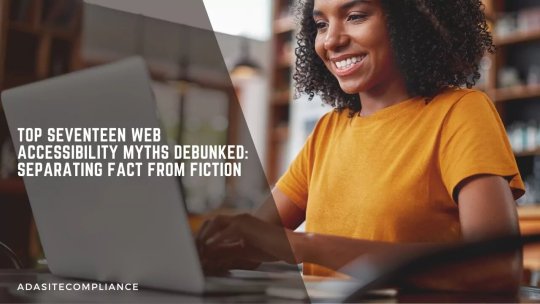
Accessibility Benefits For Businesses
ADA Site Compliance shows the benefits of accessibility for businesses!
#Web Accessibility Myths#Digital Accessibility#ADA Compliance#WCAG Compliance#Inclusive Web Design#Accessibility Testing Tools#Assistive Technologies#Accessible Website Design#Web Compliance#Accessibility Guidelines#Accessibility Misconceptions#Keyboard Navigation#Alt Text for Images#Accessibility Overlays#Color Contrast#website accessibility solutions#ADA site compliance#ADASiteCompliance#adasitecompliance.com
1 note
·
View note
Text
as a child i was always so mad we didn't have a pool. coz all the kids in every show and movie i watched always had pools. and it's like, we have a garden, why don't we have a pool like all the children on tv and thus all the children in real life must do (nevermind that i hadn't and still to this day haven't met anyone who has a pool)??? then i grew up and realised it's coz the people in my tv all lived in the united states of america and we lived in eastern europe
#the damage american media does to your mind is unimaginable#and I wasn't even allowed to watch tv most of the time. cant imagine the kinda#misconceptions ppl who had tv access all the time grew up with#pool parties.. school buses... children driving.... those stupid fucking red cups.... whatever a sophomore is#although iirc hundubs didnt bother translating the junior senior shit they just said [grade number] like normal people#but i dont know i dont think i was ever allowed to watch the kinda shows that would be set in a school#barking
18 notes
·
View notes
Text
Angel is rather alarmed one day when he hears Vox call Niffty "Nancy" and she answers to it immediately, calling him "Vaughn" in return.
Names are powerful in Hell– nowhere near as powerful as contracts, but still. When you give someone your true name, they gain a certain level of power over you, which is why contracts are usually signed using human names. Only the most audacious overlords (eg. Alastor, Valentino, Carmilla, Rosie) still use the names they had when they were alive.
Intellectually, Angel knows that Vox isn't in a mental state where he can or would even want to take advantage of this, and it's entirely possible that he may just completely forget Niffty's human name at any moment, but it still puts him on edge. Angel likes Niffty and wants to keep her safe. Regardless of how far Vox has fallen, Angel can't help but still see him as somewhat of a threat.
#everyone in the hotel knows vox's real name at this point since he so often forgets his sinner one#but none of the rest of them have shared their human names with each other yet#in niffty's mind though she thought it was only fair to share hers with vox#she knows his and he's her friend after all!#vox (ram)#niffty (ram)#angel dust (ram)#randomly accessed memories#neutral#the power of names is kind of a chicken-and-egg thing#they're powerful *because* they're kept secret#although not many people realize that#those who use their human names from the start and stick with them throughout their lives in hell can't be 'controlled' by them#they're just names#but because those who use their true names tend to prove themselves to be quite powerful#there's a misconception that they can't be influenced *despite* using their given names rather than because of it
22 notes
·
View notes
Text

John, Lord Hervey, Memoirs of the Reign of George the Second from His Accession to the Death of Queen Caroline
#quotation#quote#Lord Hervey#Memoirs of the Reign of George the Second from His Accession to the Death of Queen Caroline#Princess of Saxe-Gotha#oh dear#the princess is marrying the Prince of Wales#her mother evidently has some misconceptions about the role of the English monarchy at this point in time#English#German#Queen Anne#House of Hanover#in fact the Court seems to speak mostly French
6 notes
·
View notes
Text
I don't think ill be saying anything new with this, and I'm not trying to I just want to air a thought, but I do think that one of the biggest if not the main misconception that abled people have around accessibility/adjustable settings in gaming is that they are there to make the game easier for disabled people. The point of an accessibility setting is to make it so that everyone can play at the same level. It might make the game easier for someone who doesn't need it normally, but for the people who it is there for it makes the game playable, usually at the same level as an abled player who is not using any alternative settings. If a game relies heavily on audio, it isn't going to be easier to play just because you have subtitles and indicators for HOH/deaf players, it's going to make it, so those players can enjoy the game at the same level as non HOH/deaf players. When I turn on subtitles in, say, minecraft, it's not because I'm expecting the game to be easier, it's because I want to be able to play the game at a normal difficulty level.
#txt#and i dont think anyone who has this misconception is evil or anything#i think it's juist something that needs to be worked to reduce#so that EVERYONE can enjoy a game regardless of ability#some games arent going to be for everyone and i dont think someone should need to chnaage a game fundamentally to make it acessable#but certain changes can make it so someone who previously couldnt play it at all now can play the game#and enjoy it at the same level as everyone else#and i like games that are challenging and wouldnt ask that agame be made less challenging for me at all#i know for most gamers the challenge is part of the fun#just make it so it isnt disproportionately difficult for some players#btw i have an audio processing disorder which is where i am coming from with this#but i think it can apply to many different people and accessability needs#i just used audio stuff as an example bc its something i personally use a lot#especially in games with voice acted cutscenes or which rely on you hearing certain instructions or indicators/cues#i like audio cues but i cant always hear them#especially when its someone speaking lol then i abolsutely need subtitles
3 notes
·
View notes
Text
Is Artificial Intelligence (AI) Ruining the Planet—or Saving It?
AI’s Double-Edged Impact: Innovation or Environmental Cost? Have you heard someone say, “AI is destroying the environment” or “Only tech giants can afford to use it”? You’re not alone. These sound bites are making the rounds—and while they come from real concerns, they don’t tell the whole story. I’ve been doing some digging. And what I found was surprising, even to me: AI is actually getting a…
#AIAffordability#AIAndThePlanet#AIForGood#AITools#DigitalInclusion#FallingAICosts#GreenAI#HumanCenteredAI#InnovationWithPurpose#ResponsibleAI#SustainableTech#TechForChange#AI accessibility#AI affordability#AI and climate change#AI and sustainability#AI and the environment#AI efficiency#AI for good#AI innovation#AI market competition#AI misconceptions#AI myths#Artificial Intelligence#cost of AI#democratization of AI#Digital Transformation#environmental impact of AI#ethical AI use#falling AI costs
0 notes
Text
A general cane guide for writers and artists (from a cane user, writer, and artist!)
Disclaimer: Though I have been using a cane for 6 years, I am not a doctor, nor am I by any means an expert. This guide is true to my experience, but there are as many ways to use a cane as there are cane users!
This guide will not include: White canes for blindness, crutches, walkers, or wheelchairs as I have no personal experience with these.
This is meant to be a general guide to get you started and avoid some common mishaps/misconceptions in your writing, but you absolutely should continue to do your own research outside of this guide!
This is NOT a medical resource!!! And never tell a real person you think they're using a cane wrong!
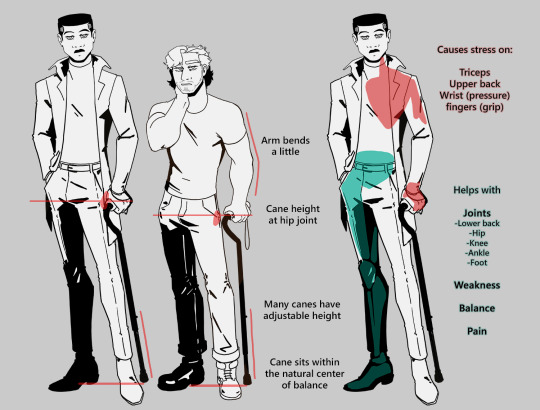
The biggest recurring problem I've seen is using the cane on the wrong side. The cane goes on the opposite side of the pain! If your character has even-sided pain or needs it for balance/weakness, then use the cane in the non-dominant hand to keep the dominant hand free. Some cane users also switch sides to give their arm a rest!
A cane takes about 20% of your weight off the opposite leg. It should fit within your natural gait and become something of an extension of your body. If you need more weight off than 20%, then crutches, a walker, or a wheelchair is needed.
Putting more pressure on the cane, using it on the wrong side, or having it at the wrong height can make it less effective, and can cause long term damage to your body from improper pressure and posture. (Hugh Laurie genuinely hurt his body from years of using a cane wrong on House!)
(some people elect to use a cane wrong for their personal situation despite this, everyone is different!)
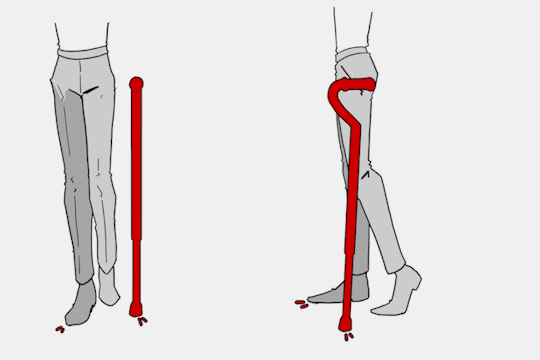
(an animated GIF of a cane matching the natural walking gait. It turns red when pressure is placed on it.)
When going up and down stairs, there is an ideal standard: You want to use the handrail and the cane at the same time, or prioritize the handrail if it's only on one side. When going up stairs you lead with your good leg and follow with the cane and hurt leg together. When going down stairs you lead with the cane and the bad leg and follow with the good leg!
Realistically though, many people don't move out of the way for cane users to access the railing, many stairs don't have railings, and many are wet, rusty, or generally not ideal to grip.
In these cases, if you have a friend nearby, holding on to them is a good idea. Or, take it one step at a time carefully if you're alone.
Now we come to a very common mistake I see... Using fashion canes for medical use!
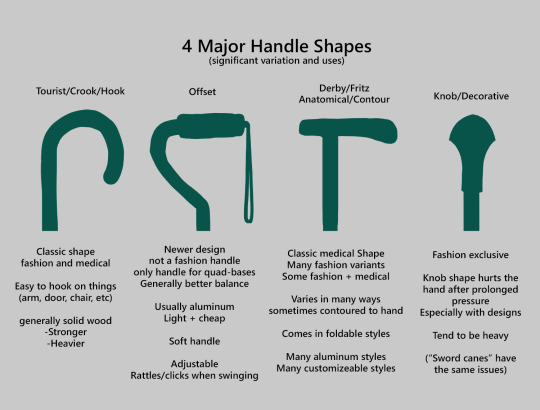
(These are 4 broad shapes, but there is INCREDIBLE variation in cane handles. Research heavily what will be best for your character's specific needs!)
The handle is the contact point for all the weight you're putting on your cane, and that pressure is being put onto your hand, wrist, and shoulder. So the shape is very important for long term use!
Knob handles (and very decorative handles) are not used for medical use for this reason. It adds extra stress to the body and can damage your hand to put constant pressure onto these painful shapes.
The weight of a cane is also incredibly important, as a heavier cane will cause wear on your body much faster. When you're using it all day, it gets heavy fast! If your character struggles with weakness, then they won't want a heavy cane if they can help it!
This is also part of why sword canes aren't usually very viable for medical use (along with them usually being knob handles) is that swords are extra weight!
However, a small knife or perhaps a retractable blade hidden within the base might be viable even for weak characters.
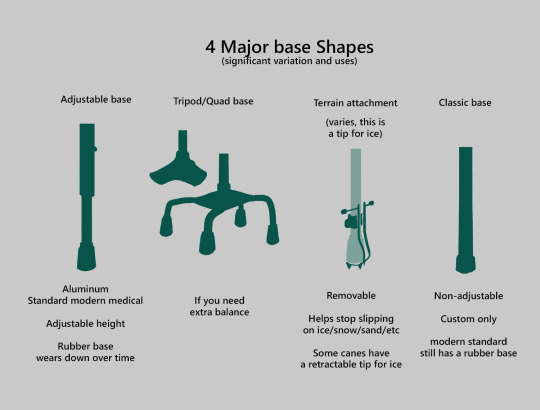
Bases have a lot of variability as well, and the modern standard is generally adjustable bases. Adjustable canes are very handy if your character regularly changes shoe height, for instance (gotta keep the height at your hip!)
Canes help on most terrain with their standard base and structure. But for some terrain, you might want a different base, or to forego the cane entirely! This article covers it pretty well.
Many cane users decorate their canes! Stickers are incredibly common, and painting canes is relatively common as well! You'll also see people replacing the standard wrist strap with a personalized one, or even adding a small charm to the ring the strap connects to. (nothing too large, or it gets annoying as the cane is swinging around everywhere)
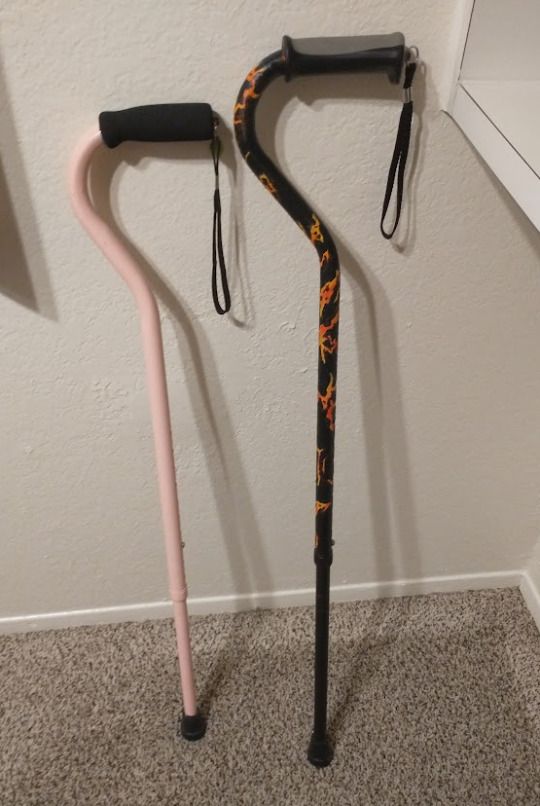
(my canes, for reference)
If your character uses a cane full time, then they might also have multiple canes that look different aesthetically to match their outfits!
When it comes to practical things outside of the cane, you reasonably only have one hand available while it's being used. Many people will hook their cane onto their arm or let it dangle on the strap (if they have one) while using their cane arm, but it's often significantly less convenient than 2 hands. But, if you need 2 hands, then it's either setting the cane down or letting it hang!
For this reason, optimizing one handed use is ideal! Keeping bags/items on the side of your free hand helps keep your items accessible.
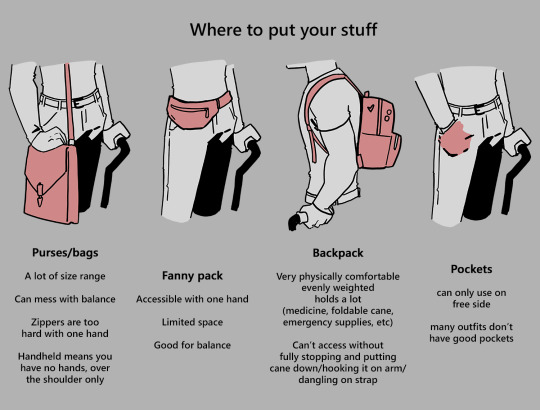
When sitting, the cane either leans against a wall or table, goes under the chair, or hooks onto the back of the chair. (It often falls when hanging off of a chair, in my experience)
When getting up, the user will either use their cane to help them balance/support as they stand, or get up and then grab their cane. This depends on what it's being used for (balance vs pain when walking, for instance!)
That's everything I can think of for now. Thank you for reading my long-but-absolutely-not-comprehensive list of things to keep in mind when writing or drawing a cane user!
Happy disability pride month! Go forth and make more characters use canes!!!
#mobility aid#cane user#writing tips#writing advice#drawing tips#art tutorial#art tips#art reference#art resources#art help#my art#long post
93K notes
·
View notes
Text
An anonymous trans donator asked skizz if he'd say a "trans rights" for pride month and he softly shut it down saying "this channel about good times good vibes, and not anything political. I've got nothing against anything, I've driven that home."
I know it's parasocial to be disappointed that a man in his mid 40s considers queer rights a political topic and it doesn't mean I won't watch him but,,,,, I couldn't help but feel my heart sink a little as that played out live. Skizz says he wants to bring happiness, and joy, and that's literally all this person wanted. A firm, no room for doubt affirmation that Skizz sees and cares for his trans fans. I don't think he's transphobic, but I do think he has a misconception about why saying "trans rights" matters, and why it SHOULDNT be political. Pride month exists for the same reason there's a women's month, and a black history month, and a Juneteenth, and a Veteran's Day. We are lucky to be alive, and we're still fighting for our rights to this day, so we need times to just celebrate our continued existence.
And like,,,, I'm sure that he's heard a lot online but the discussion on trans rights is only political because basic human rights are being denied to trans people for no reason other than bigotry. We want basic human rights for all, for trans people, gay people, disabled people, people of color. We want the standard of care the government and its services and the businesses of our country to be better, more accessible, and affordable for EVERYONE, regardless of gender, race, political belief, religion. The fact that THAT desire is a political matter is because politicians keep denying it.
There were also members of his chat that subtlety ragged on the anonymous donator, saying it was "weird" and "cringe". I have no words for them.
I know Hermitcraft is supposed to be a safe space, and a place to get away from the world's problems, but so you know what is counteractive to that? Bigotry. Transphobia. There are so many young queer fans of hermitcraft, and to say that their existence, this one little piece of affirmation isn't allowed, is insulting and disheartening. Good vibes isn't all free speech and being neutral, it's explicitly saying "you are safe here. I see that you are in danger and you are safe."
I will also leave this video here because I think it's important to be firm about keeping bigotry out of your community, regardless if it means you get less viewers or are seen as "political"
[UPDATE: this is where my story ends in this matter]
#rant#text#skizzleman#hermitcraft#hermitblr#trans rights#this man cannot joke about being bisexual and then deny a trans viewer their little spot of hope the next day#they are one and the same#skizz sitch 2k25
2K notes
·
View notes
Text
Weight is also incredibly genetic, although science isn't sure of the exact causes (not strictly scientific discussion, more anecdotal evidence)
What you end up weighing, how much fat you hold, how easily you gain or lose muscle mass, and a lot of other factors are determined by your genetic makeup, On Top Of environmental factors or what you're doing every day. So super generalized "lose weight fast" or "this is what you should be eating" articles aren't helpful for almost anyone! You (and a doctor when applicable, although I and many people face ableism and fatphobia in getting real medical information) know what's best for your body, and some times the best option is to do what makes you feel good, inside and out
fatphobia and ableism is so insidious. You can look up like, food, and it'll say "eating a lot of food causes diabetes" and you're like oh dang what? I thought we didn't know the cause of diabetes. So you look up what causes diabetes and it says "we still don't know what causes diabetes" bruh they're just making shit up to give people eating disorders
#body posititivity#common misconceptions#fatphobia#accessibility#sometimes doctors suck ass and just tell you generalized information instead of actually thinking or caring about you#finding the right doctor is imporant
48K notes
·
View notes
Text
Accessible Website Design
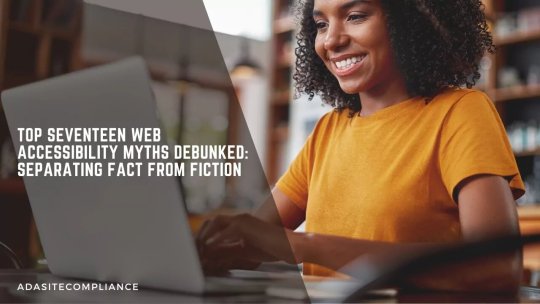
Top Seventeen Web Accessibility Myths Debunked: Separating Fact from Fiction
Accessibility is no longer a ‘luxury’.
Incorporating accessibility into a website today comes part and parcel with web development. With the internet harboring users with and without disabilities who use it for information, bookings, enrollments, purchases, and even jobs, websites need to be compliant.
Unfortunately, many aren’t because some misconceptions and myths cause confusion and hesitance to hinder progress. So here’s an attempt at separating fact from fiction by debunking the top 17 common web accessibility myths.
Remember, web accessibility is no longer just a legal requirement; it’s part of digital inclusivity. It increases your reach and demonstrates your commitment to serving everyone in your community.
If achieving compliance seems overwhelming, we at ADA Site Compliance can simplify things for you. Our team of accessibility experts can help you meet these requirements while you focus on your core business.
Top 17 Web Accessibility Myths Debunked
Let’s now examine these widely misinterpreted web content accessibility principles and guidelines. At the end of the article, you will realize that all those misconceptions you had about web compliance are just myths.
Myth #1- Web Accessibility is Only for Blind People and Users with Visual Impairments
False.
Other people with varied disabilities, such as deafness, limited motor skills, and cognitive limitations, also visit websites for various reasons. An accessible website gives them access to the information they seek, ensuring your website reaches more people.
Myth #2- Web Content Accessibility Guidelines Compliance Ensures Digital Accessibility
False.
Yes, the WCAG provides a framework to enhance digital accessibility. However, compliance alone is not enough for a completely accessible website. Website owners and developers must understand and implement the WCAG principles, as factors like cumbersome user interfaces, poor content, and insufficient testing can lead to incompliant websites.
Myth #3- Accessibility is Only About Making Websites Accessible
False.
Accessibility applies to other digital assets, including mobile applications, PDFs, and other digital documents. Organizations must thus ensure accessibility across all digital platforms for inclusive digital experiences.
Myth #4- Accessibility is Only Relevant for Disabled People
False.
It is not just people with disabilities that benefit from website accessibility. Digital compliance features benefits extend to broader groups, including:
Older adults facing sensory or cognitive challenges as they age
Individuals with temporary disabilities due to injury, illness, or surgery
People experiencing situational limitations, like background noise
Non-native speakers struggling with language barriers hindering understanding and engagement
Myth #5- Accessibility Means Redesigning a Less Visually Appealing Website
False.
Many businesses believe digital accessibility requires a complete website overhaul or poor visual appeal, which is far from the truth. Minor adjustments can significantly create an accessible digital experience without significant redesign efforts.
Myth #6- Digital Accessibility is Only a Concern for Large Corporations
False.
Size is not a criterion for digital accessibility; failure to meet the many digital accessibility laws can lead to legal repercussions and damage a company’s reputation.
Small businesses may face resource constraints, but the numerous tools and online resources can help them understand and ensure web compliance. Embedding accessibility practices from the start ensures web compliance for companies of all sizes.
Myth #7- Accessibility Limits Websites to Text-Only Content
False.
The myth that accessible websites must be plain, text-heavy, and free of multimedia elements stems from earlier text-based web pages. However, modern standards allow visually engaging, multimedia-rich websites that meet diverse accessibility needs.
Strategies like adding alt text for images and captions and transcripts to videos ensure compatibility with assistive technologies. It not only supports users with disabilities but also enhances everyone’s user experience.
Myth #8- All It Takes Is A Quick Technical Fix For an Accessible Website
False.
Web compliance is more than a simple technological adjustment. True accessibility is not just a developer’s responsibility but the joint effort of various teams, including design, testing, and content creation. Relying solely on automated tools or accessibility overlays does not ensure comprehensive accessibility.
Myth #9- Accessibility Can Be Addressed Last-Minute with Simple Fixes
False.
While adding elements like alt text at the last minute may seem convenient, genuine accessibility requires careful planning and integration. Last-minute changes usually require significant counterproductive restructuring, which may harm the user experience, especially for those requiring accessible design.
Besides, including alt text in sites is only one piece of the accessibility puzzle. A truly compliant website involves various other steps, including:
Semantic HTML tags to structure content and enhance readability and interaction.
Keyboard Navigation of the website.
Color Contrast to make text and images readable.
Focus Management highlights elements currently in use for better navigation and clarity.
Using Selective ARIA when necessary to support assistive technologies, as overuse can create confusion.
An accessible design demands proactive attention to these elements throughout development rather than depending on quick fixes at the end.
Myth #10- Accessibility is Expensive and Time-Consuming
False.
Integrating accessibility into an existing website can seem complex, require multiple resources, and be time-consuming. However, prioritizing accessibility from the start can significantly reduce most associated challenges.
In fact, with the right planning and skilled development teams, accessibility can be achieved with minimal additional time and resources as an integral part of the development process.
AI-powered accessibility tools also make digital accessibility more affordable and accessible for all website owners to use and ensure websites are accessible for individuals with disabilities. They help achieve substantial accessibility improvements in just a few hours by automating the detection and correction of many common accessibility issues.
Myth #11- Achieving Web Accessibility Is Overly Complicated
False.
Web accessibility standards can seem complex, but their implementation is not complicated. Multiple tools and resources are available to help developers and website owners ensure digital accessibility.
It is better to start with basic principles, such as providing alternative text for images and ensuring keyboard navigation, and then later delve deeper into more advanced techniques.
Besides, remember that automated accessibility testing alone cannot guarantee complete digital accessibility. Automated tools can help identify issues such as color contrast and structural errors.
However, they cannot fully address complex challenges like unclear language and intricate site designs. Human review by accessibility experts is crucial in ensuring website compliance.
Myth #12- Accessibility is Just a “Nice-to-Have” Feature
False.
Ensuring website compliance is not an option; it is a strategic move with significant potential to impact your business success. An accessible website can do a lot for your business, such as attracting a larger audience, driving higher revenue, enhancing brand reputation, and mitigating legal risks.
Besides, with legal scrutiny, accessibility can no longer be an option. A website owner does not want a lawsuit, considering the financial and reputational risks of overlooking accessibility efforts.
Myth #13- Accessibility is All About Avoiding Legal Trouble
False.
Contrary to popular belief, accessibility is not only about meeting legal requirements to avoid lawsuits. Legal compliance is essential, but its benefits extend far beyond this. For example, implementing accessible design dramatically enhances user experience and boosts your brand’s reputation.
Besides, accessible content opens your entire website or application to a broader audience, ultimately increasing user satisfaction and building loyalty.
Myth #14- Digital Accessibility is Optional
False.
Accessibility is more than an option; it is a requirement in many countries, enforced through laws and regulations. It may not be the top priority for all website owners, but digital compliance is essential for ethical reasons and for creating an inclusive experience for everyone.
Following accessibility standards helps meet legal obligations and ensures your website reaches a broader audience, including individuals with disabilities.
Myth #15- It’s Better To Have Separate Websites for Disabled Users
False.
It was previously thought that having a separate website for users with disabilities ensured accessibility for disabled people. However, this strategy is ineffective and biased, as managing multiple websites is expensive and work-intensive and can lead to content and performance discrepancies.
It is, instead, better to design and develop a website that is inherently accessible to everybody from the beginning.
Myth #16- Accessibility is a One-Time Fix
False.
Many people think digital accessibility is a one-time fix, with nothing else to do once experts ensure compliance. This misconception has led to poorly designed products that users cannot effectively access.
On the contrary, web compliance requires constant commitment and oversight, with continual integration of accessibility features from the initial design through ongoing maintenance. Website owners and developers must regularly review and update the website to meet evolving accessibility standards and user needs.
Myth #17- Only Disabled Individuals Can Test To Ensure Accessibility
No, this is false.
Disabled individuals who frequently rely on assistive technology are effective accessibility testers. However, they are not the only people equipped to evaluate accessibility. All that is needed are the proper training and accessibility testing tools to become adept at identifying and addressing accessibility issues.
Closing thoughts
Dispelling these seventeen myths should inspire a more inclusive web design and development mindset. Remember, accessibility is a legal requirement and moral commitment to making the digital world available to everyone, regardless of individual abilities.
By prioritizing accessibility in our choices, we can create a more equitable, user-friendly online experience for all. It also increases your reach and demonstrates your commitment to serving everyone in your community.
Do not worry if achieving compliance seems overwhelming. We at ADA Site Compliance can simplify things for you. We have a team of accessibility experts who can help you meet these requirements while you focus on your core business!
#Web Accessibility Myths#Digital Accessibility#ADA Compliance#WCAG Compliance#Inclusive Web Design#Accessibility Testing Tools#Assistive Technologies#Accessible Website Design#Web Compliance#Accessibility Guidelines#Accessibility Misconceptions#Keyboard Navigation#Alt Text for Images#Accessibility Overlays#Color Contrast#website accessibility solutions#ADA site compliance#ADASiteCompliance#adasitecompliance.com
0 notes
Text
Exploring How Toph Beifong Could Be Played By A Blind Actress and Refuting Reasons Some People Believe She Couldn’t

[Image Description: Toph Beifong from Avatar: The Last Airbender. She is waving her hand in front of her face after joking that she spotted the great library, tricking the Gaang only to remind them that she is blind. She rides on Appa who is flying above a desert landscape. End I.D.]
The live-action adaptation of season 2 of Avatar: The Last Airbender is underway. This means people are discussing Toph again, much like they did during pre-production of season 1. I have seen and even participated in promoting the idea of Toph being portrayed by a blind actress. Similarly, I have come across push-back against the idea.
Instead of if Toph Should Be Portrayed by a Blind Actress, Let’s Focus on How She Could
(should and could are bolded for emphasis)
This post will address common misconceptions that serve as barriers to the idea of a blind actress portraying Toph.
A Few Notes Before We Start
These points come from posts on online forums, YouTube comments on videos related to the casting of Toph, and tumblr posts. No one will be specifically called out here, as while these points may be attributed to certain individuals online, they represent much wider views that are shared by many, even without malicious intent. These common misconceptions stem from unchecked ableism and general lack of information. Keep in mind that my intention is not to call out any individual person, as ableism is a widespread, collective problem. The reasons I refuted in this post showed up repeatedly and were not isolated opinions of one or two people.
1. No, it would not be too difficult to find an actress who is Asian, blind, and the right age

[Image Description: Toph as The Blind Bandit uses earthbending to create three pillars of rock that shoot at an angle from the ground and smash into her opponent, throwing him against the arena wall. End I.D.]
This point suggests that it is difficult to find candidates fitting Toph’s description. I suspect this is due to racism and ableism, in that a white and abled person is considered default and therefore believed to be more common, especially by Western studio standards. This is not truly the case. People of color and disabled people are auditioning, especially for the comparatively few roles that seek them out specifically, such as Avatar: The Last Airbender.
Blind Asian people exist. Some of these people are also actresses. Some have backgrounds in dance or martial arts, especially because many actors do similar activities to increase endurance and versatility. Finding a pre-teen or teenager to play Toph would not be as challenging as many people believe, especially those who already underestimate the amount of blind people in the world and their abilities.
Those who argue this point may be under the impression that a blind actress would be out of reach due to low numbers and lack of interest in auditioning. Blind people are auditioning. The reason you don’t see them on screen is because most of them are ignored in favor of abled actors. For example, in this video, Molly Burke discusses not being chosen to play a blind character whom she was told was based on her own life. The actress chosen to play the character was not blind. You can watch it here.
Additionally, Netflix has the ability to hold a widespread casting call. They are not a tiny studio doing productions in someone’s backyard. They have access to a wider pool of actresses than the average person might think, particularly if said person is not familiar with the resources big studios often have at their disposal.
In fact, Netflix is doing just that. Below is a link to their casting call, which encourages blind and low vision actresses to audition.
Link to casting call here with alt text.
2. Some people believe Toph isn’t really blind and therefore the actress who plays her needs to be able to see

[Image Description: Toph as The Blind Bandit using bending, with shots showing her hands and feet. As her bare foot slides sideways across the ground, the camera zooms out to show her sensing vibrations. The image turns greyscale, with circles of white vibrations emanating from around Toph’s body, where they expand and flow outward. End I.D.]
The rationale behind this is probably the same as it is for Daredevil, meaning some don’t consider Toph to be blind because of the way she uses her bending.
An argument could be made that Toph’s powers erase her blindness or that her powerful abilities make her less relatable to the average blind person. However, I suspect that many sighted people engaging with these discussions of Toph’s casting are not also concerned with questions of erasure or relatability. In discussions questioning her blindness, the evidence given mostly centers on Toph’s physical abilities rather than relatability to real blind people.
Her bending aside, Toph is certainly blind. She experiences ableism from her parents and general community. Blindness shaped her life in a lot of ways, even with her bending, which is also influenced by her disability.
We see Toph being guided while running on the airship, needing assistance while walking on ice, and struggling to travel in a desert. She uses her other senses, including hearing and tactile senses. She has limitations regarding how she is able to interact with an unaccommodating world, such as inaccessible reading and writing systems.
There are also lifestyle and cultural implications of blindness extending beyond the inability to see. Being blind is not only about what one can and cannot do, which is true of Toph’s experience as well. Blind people may have different values, experiences with family and friends, different senses of humor, or may place higher value on other sensory experiences compared to sighted peers.
Whether or not Toph is good blindness representation can be argued. However, she is still a blind character. Her blindness influences her whole life, even as she is more than her blindness at the same time. Her life as a blind person is about more than limitations and abilities. Reducing her, and any blind person, for that matter, to only these facets of her experience oversimplifies what it is like to be a blind person.
Claiming that she isn’t a blind character because of her ability to do x, y, and z can be incorrect for a lot of reasons.
Blind people are more than what we can do or what we produce. Our experiences are rich and varied. Our lives are inherently meaningful no matter our abilities or limitations. It is both ableist and inaccurate for sighted people to attempt to put us all into boxes.
Additionally, blindness is a spectrum. [Bolded for emphasis.] You can read about it at the following posts on my blog:
here
here
here
and here.
Here is a good list of legally blind YouTubers with various types of visual experiences.
According to various sources on the blindness spectrum, about 85% to 95% of blind people have some remaining vision:
93% according to RNIB
This Perkins School For the Blind fact sheet estimates about 90 to 95% of blind have some remaining vision
American Foundation for the Blind estimates about 15% of blind people are totally blind and discusses the spectrum of blindness here
The spectrum of blindness is important because our experiences become even more diverse when the spectrum is considered. This means that assumptions about what we can and cannot do become even harder for sighted folks to guess accurately.
This accuracy is important if sighted people are going to try to put limitations on blind people, which they have no business doing anyway. They are not the authority on what blind people can do, what we cannot do, or what is good for us. Only blind people can answer that for themselves.
Lastly, blind people are already used to navigating and interacting with their surroundings. They have had anywhere from months to a lifetime of experience, which would translate better to Toph’s ease with her blindness and confidence in her bending.
While an actor wearing contacts to obscure their vision might stumble around and have difficulty on set, someone who is actually blind could lend Toph’s character a much more relaxed, confident attitude in addition to possessing experience navigating in a way that works for her. She is used to being blind. Therefore, an actress who is also used to being blind brings a lot to the performance in terms of physicality, attitude, and the ability to focus on portraying the character, rather than simulating blindness.
Which leads me into the next point.
3. The idea that Toph doesn’t move like a blind person relies on stereotypes of blind people

[Image Description: A GIF from the episode “The Runaway”. Toph, Sokka, and Aang all con some con artists and cheer after their victory, Toph raising her arms high before snatching the prizes. They all run away. End I.D.]
There is no specific way of moving like a blind person. Like sighted people, the way blind people move may be influenced by many factors, such as level of vision, how long they have been blind, their mobility aid, navigation techniques, familiarity with their environment, level of confidence, feelings of safety, other disabilities, energy levels, cultural factors, and more.
While there are mannerisms that are recognizable to blind communities, there is no one way to move like a blind person. Just as there is no one way to look blind.
The ideas of “not moving like a blind person” or “not looking blind” come from stereotypes of blindness. In fact, these ideas can be so pervasive that blind people who don’t fit stereotypes may be accused of faking. I explore this subject here.
In this video, Sam from The Blind Life discusses the experience of performing blindness or being pressured to act more blind than he is. Link here. He explains while he has some vision, he uses his cane to indicate to others that he is blind. This is one of the main functions of a cane. Sam explains feeling pressure to adhere to certain stereotypes about blindness or risk being accused of faking.
Similarly, in this video linked here, Molly Burke discusses the stereotype that blind people’s eyes look noticeably different from sighted eyes. This includes the inaccurate belief that all blind people have cloudy eyes, blank eyes, eyes that are always closed, or eyes that simply must be covered in dark sunglasses to protect the sensibilities of sighted people. Molly explains that while blind people can certainly have these attributes, not all of us do. Molly laments that the phrase, “You don’t look blind,” is either used to invalidate her or to praise her for passing as a sighted person, which is ableist.
Just as blind people don’t look the same way, we don’t move the exact same ways either. That applies to Toph as well. For example, she prefers to keep her feet on solid ground for bending purposes, orientation, and possibly due to cultural factors valuing stability and connection to the earth.
4. The idea that accommodations would be impossible to provide is rooted in ableism

[Image description: A GIF of Toph and Zuko sitting beside each other on the floor at the Ember Island theatre episode. Toph punches Zuko’s arm. Metaphorically for the purposes of this post, she is punching ableist ideas that have nothing to do with Zuko. End I.D]
Here is a thread I shared in the early days of this blog, wherein the topics of blind actors and accommodations are discussed. The entire thread might also be helpful for this post, as I explore the same points, which shows how common these misconceptions are. While this may seem to be an isolated online disagreement, none of these arguments are new. That is why I believe this topic is important— these arguments about accommodations being too difficult or a burden on others also pop up in conversations about other workforces and other disabilities.
A blind character not being played by a blind actor is one thing. A blind person not being hired for a job they are qualified for due to resistance to providing accommodations is not so easy to ignore, not so seemingly isolated a concern. These barriers don’t only apply to blind actors looking for work. They apply to all blind people looking for work.
That means most of this isn’t really about Toph, nor the opinions of random people online. Instead, I hope to highlight common patterns in ableist thinking and dispel these ideas using a character people care about. This is, of course, in addition to my own desire to have a blind actress play Toph.
With that said, let’s explore what work accommodations might look like using examples of blind actors.
Dionne Quan is a blind actress who has an extensive filmography for voiceover work, including popular characters such as Kimi from Rugrats. In this article from when the character was first introduced, she discusses how she performs. Link.
Quote from the article: “Most of the recording was done in a studio with just a mike and a stand for the script. I had the lines in braille, and I would read them on the way over to get into character. You have to have your bag of tricks ready to go.”
Most of the work Quan discusses involves typical acting stuff. The accommodations given to her are similar to adaptations that might be made in an office setting. Additionally, with all the technology available now, it is easy to make a script accessible through large print, VoiceOver and memorization, Word document instead of a PDF, a Braille display, etc.
And as of August 2024, Quan can add adult Toph Beifong to her list of characters. Which is super exciting and, I thought, an appropriate fact to include in this post. You can read more here.
To continue the discussion of accommodations for actors, I would like to discuss Ellie Wallwork. Wallwork is a blind actress who has performed on Doctor Who.
She describes her experiences on set, such as blocking scenes and using tactile accommodations in this short video from the SeeSaw podcast. Link here.
Transcript:
Elie Wallwork speaking:
“Obviously, markers are just normally flat bits of tape on the floor. I had to have some sort of tactile ones so I knew where I was stepping onto. And it takes longer. It definitely takes a bit longer. I guess the thing that frustrates me about the industry is that sometimes casting directors will think, ‘Well, how could a blind person possibly do this, do that? How could they do stunts? How could they even navigate around set?’ But it’s perfectly possible if you— for example, with the crew that I had on all the productions I’ve been on, they’ve all been really kind, really patient with me and able to understand that, yeah, okay, it might take me five minutes longer to block a scene, but that’s fine because it means it’s authentic.”
End transcript.
You can listen to the full episode here.
Lastly, I find that many sighted people are not generally knowledgeable when it pertains to what blind people can or cannot do. Examples of this lack of knowledge include frequent questions about how blind people read, exist in online spaces, cook, etc—and these are simply from posts on my own blog.
Here is a link to a discussion thread that explores ableist assumptions people often make what blind people are or are not able to do. It particularly relevant for this topic. Link can be found here. Please remember that while I did respond to some folks who expressed opinions colored by ableist assumptions, that post is not about them. Just as this post is about addressing ableism in general rather than from a specific source.
The point is: consider why abled people are so comfortable stating what blind people can and cannot do, when one of the most common questions about blindness is still “how do you use a phone or the internet?”
People who aren’t blind often fail to grasp what our limitations actually are. Many people are still surprised to learn that technology or accommodations exist for us, despite having access to various forms of technology themselves. They struggle to understand that we can live our daily lives, possibly because they personally cannot imagine themselves without the vision they rely on, such as that time a professor asked blind content creator Stephanie Renburg [quote] “How do you live?” when the conversation was supposed to be about school accommodations [Link here].
This brings me to an assertion that is often made when sighted actors obscure their vision in order to play blind characters. It is often noted that it was too hard for them emotionally, mentally, and physically. Because of this reaction, the assumption is made that a blind person cannot possibly perform the role.
For example, in the article linked here, this is stated about Jamie Foxx in his role as Ray Charles. “Some actors, including Jamie Foxx as Ray Charles in “Ray” (2004, best actor) and Blake Lively in “All I See Is You” (2017), have chosen to wear ocular prosthetics, rendering them literally blind during their performances. But this creates a new problem: Unlike real blind people, who can spend years honing their orientation and mobility skills, the blindfolded sighted person becomes lost, confused and frightened with the sudden loss of sight — Foxx told interviewers he began hyperventilating as soon as his eyes were glued shut with the custom prosthetic eyelids that the filmmakers affixed over his eyes.”
Being blind is different from a sighted person temporarily obscuring their vision. Blind people have a better handle on being blind because we’ve been doing it longer. Blindness is part of our lives. Of course blind people are going to have an easier time portraying blind characters. This means most of the concerns people bring up when discussing sighted actors struggling with being unable to see won’t actually apply to blind people who have been at this for far longer.
I also wanted to address the idea that hiring blind actors would cost more, according to the assertion made in that thread about hiring blind actors, which you can read here if you haven’t already. While I can understand why someone might believe hiring a blind actor would cost more, I believe it would actually cost less.
Blind actors can use their own canes or other assistive devices used by the character, which saves money on expensive materials
Blind actors likely already have experience with O&M training, saving money and time that would otherwise be spent training a sighted actor, such as described here
Blind actors don’t need contacts or prosthetics, which may otherwise be used help an actor simulate blindness
And blind actors would have an easier time navigating sets, dancing, or doing required physical activities while blind, which reduces the learning curve that sighted actors with obscured vision need
A few Disclaimers:
1) Blind people learn from our communities and through life experience. While we naturally have more experience being blind, our knowledge is enhanced through learning from other blind people and participating in training designed to improve our life skills. I maintain that a sighted person obscuring their vision for a few hours will not have the same level of experience.
2) Reminder that blindness is a spectrum that a blindfold cannot replicate.
and 3) This post is not to say that sighted actors cannot do well or cannot put effort into their performance. According to the article above, Charlie Cox won an award from the AFB for his commitment to portraying Daredevil. However, just because there are sighted actors willing to put in the work does not mean blind actors can’t. I wanted to include this disclaimer in case someone sees the AFB article I shared and worried I’m trying to disparage actors who have already portrayed blind characters and happened to do a good job. After all, I love the original performance we received from Michaela Murphy, who originally voiced Toph. That doesn’t mean studios should not make an effort to cast more blind actors moving forward, nor does it justify any of the silly or explicitly ableist reasons people give for why sighted actors must be chosen over blind ones.
Let us return to refuting those excuses with the last thing I wanted to address.
5. Some people are concerned that a blind person might get hurt doing martial arts, but so can literally anyone else

[Image description: GIF of Toph dressed in Fire Nation attire. She punches through a rock.]
Kids can get hurt in any kind of sport, yet society doesn’t try to keep children from these activities for their own safety. However, disabled kids—and adults for that matter—are often reminded that we are being kept out of spaces for our own protection. Which we didn’t need, nor ask for.
This need to protect disabled people can be not only infantilizing, but hypocritical as well. For example, a blind person might be discouraged from playing recreational sports in a misguided attempt to protect them. Conversely, structures that keep blind people at risk are allowed to stay firmly in place, such as discrimination around transportation, inaccessible infrastructure, and poverty.
Blind people play sports anyway. Often, these sports carry their own risks of injury, as most sports do. Blind people have the agency to understand this and consent to it. Examples include blind football [link] and goalball [link].
Here is a video of Sadi the Blind Lady discussing goalball with Eliana Mason, a Paralympic athlete who plays goalball professionally.
Transcript: “Goalball is sport for blind and visually impaired athletes. It was created after World War II for blinded veterans and is now a Paralympic sport. The coolest thing about it is that everyone wears eyeshades so no matter what your level of vision loss is—because blindness is a spectrum— it equalizes it. The ball has bells in it and the court is straight with tape over it. It’s on a volleyball sized court. It’s three on three. And basically in offense, we are throwing the ball as hard as we can with a lot of technique involved, about 30 to 45 miles an hour to have it hit the ground and roll and hit the other players on their bodies. And on defense, you are throwing your body out and diving in front of this 3 pound ball and blocking it. So essentially you want to get hit with the ball.”
End transcript.
Getting hit with a ball, especially in the face or stomach area, is going to hurt. That is okay, because as long as safety precautions are taken, pain might be part of the experience depending on the rules and anticipated possibility of injury.
Martial arts and dance, which are backgrounds sought specifically in the Netflix Toph casting call, can also lead to accepted forms of pain or discomfort. While one could argue that sports injuries could and should be preventable, this post is more concerned with the expectation of pain, injuries, and what steps are taken to prevent them, such as protective gear or an experienced coach / teacher.
A blind person auditioning for Toph knows that martial arts will be involved. She will spend time learning choreography, building trust with co-actors, and figuring out works best for her. This structure is similar for blind people playing football or goalball or tennis or fencing or whatever else they want to do.
Lastly, people who aren’t blind also experience pain or injury during sports. Same with martial arts or dance.
The actress who plays Toph might get hurt. She might not. Some pain might even be an expected part of training. That is no reason to exclude a blind person from participating. That is no reason to say Toph couldn’t be played by a blind actress. [Bolded for emphasis]
Lastly, anyone training actors on fight choreography already knows how to do so safely. That fact that this is choreography is also helpful, allowing for memorization of actions and reactions. Conversely, the sports and physical activities I listed above are not choreographed, with the exception of dance, and are therefore less predictable. Therefore, if blind people can get head injuries playing on a recreational blind football team, a blind actress can handle fight choreography.
Closing
Thank you for reading all of this. My points still stand whether or not a blind person is actually cast for Toph.
Too Long, Didn’t Read:
Unchecked ableism can lead to oppression even if it is unintentional
Blind actors exist
A blind actor would better capture Toph’s ease and confidence with her blindness
Blind people can do a lot more than sighted people usually think they can
Blind people also face discrimination and limitations that sighted people may not have considered
Blindness is a spectrum and most blind people can still see something
There is no one way to look or move like a blind person
Accommodations are not that difficult to provide
Hiring a blind person would actually cost less money
Most of the popular reasons people believe Toph cannot be played by a blind actress are rooted in ableism
This post is not only about Toph or actors, but an example of how unchecked ableism can be harmful
For example, low employment rates for blind people, inaccessible online resources, or Toph-related posts shared without image descriptions
Toph Beifong could totally be played by a blind actress
#blind#atla toph#toph beifong#atla#netflix atla#netflix avatar#Toph Beifong casting Netflix#ableism#blind characters
1K notes
·
View notes
Text
Worldbuilding and Magic Systems: Things to Consider
Have a magic system in mind for your fantasy world? Here's a list of things to consider to help you tie this system into the rest of your worldbuilding, so that it feels more believable and realistic.
Source
What is the source of magic? Is it natural or man-made? Can humans use magic or is it a force of nature that only animals or other races can use?
Does magic originate from inside a person or does it require external items to use? If it comes from items, can the items be made? How long does it take to make the items?
Does the magic cost anything- money, stamina, health, etc.?
Can a person be cut off from being able to use magic? If so, how?
Prevalence
How common is magic in your world? Is it so common that everyone has seen it or is it a subject of myths and rumors?
How long have the people in your world known about magic? Has it always been there or is it a new discovery?
How much does the average person know about magic? How much do experts know? What do people not understand about this magic? Are there any common misconceptions? Myths?
Is magic revered or feared? Or if it's common, is it taken for granted? Are there any taboos surrounding magic?
How many types of magic are there? Are some more common than others?
Are there dedicated schools of thought surrounding the study of magic? Is it taught about in schools? If so, is it taught to children or only at the college (or equivalent) level?
Accessibility
Who can use magic? Who can't? Is it something that only the rich and powerful can use? Why? Or do genetics determine who can use it? Wealth?
Are there any physical limitations that might restrict who can use magic? For instance, maybe old or sickly people can't use magic because it requires a lot of physical effort. Does your society provide accommodations for people who can't use magic? Is a lack of magic ability considered a disability?
Does education level determine capacity for magic?
How easy is it to gain access to magic? How easy is it to learn about magic?
Power/Usefulness
How powerful or useful is magic for different parts of society? Military? Medicine? Entertainment? Art? Childcare? Government? Communication? Business?
How does magic affect the politics of your world? How does it shape the economy? Are there feuds over the use of magic? Do powerful groups in your world have an incentive to limit the use and accessibility of magic? Why?
What happens when people no longer have access to magic? Does this cripple their ability to go through their daily lives? How?
Mix, match, and cross-reference these with other elements of your worldbuilding to form a believable magic system that lives and breaths just as the rest of your world does. For every answer you give to the questions above, consider and build upon the implications of what that might mean for your world. A worldbuilder's best skill is the ability to ask "How will this affect ___?" So make sure you're always considering the ripple effects of each element you add to your world.
Happy worldbuilding y'all!
#creative writing#writing#writers on tumblr#writerscommunity#writing advice#writeblr#writing tips#fiction writing#writing help#fantasy worldbuilding#worldbuilding#fantasy writing#fantasy writer#fantasy novel#fantasy#magic#magic system
1K notes
·
View notes
Text
Okay so for those of you who weren't following me before I destroyed my old blog I'm a barefooter and a lot of people are afraid of me stepping on glass. That's not an issue for me because I also carry a white cane. Also, it just feels nice to be grounded (and not step on glass).
Glass
I spit pieces of glass On dark concrete alleys But you were blind, So blind that you hurt yourself Stepping all over me Well, I'm so sorry! I guess this is the price you pay For thinking you could hurt me And I would stay holy.
~ A. A. Roman
#barefooter#grounding#sensory experience#white cane#blind community#visually impaired#disability pride#adaptive living#navigation#misconceptions#accessibility tools#safety tips#personal experiences#living authentically#sensory awareness#new followers#about myself#personal post#reintroduction#blog content
103 notes
·
View notes
Text
people in universe would have common misconception about both Giotto and Tsuna being super honorable in a fight etc etc
No
They’re mean and they play dirty if they don’t like you, but ESPECIALLY Tsuna.
Never gonna forget that Tsuna pretended he was gonna poke Iemitsu’s eyes out only to blast him right in the face with an x burner when his wrist was caught and even reborn was like “lol nice get his ass”
Then there was also him just straight up snapping Mukuro’s trident in two bc he got pissed off
Ripping Byakuran’s wings off… Burning them to cinders right in front of his face while he was in agony because uh hello that’s part of his body you’re fucking CRAZY
Literally just standing there and allowing Bermuda to take himself out by flying straight into Tsuna’s fist. The sheer disrespect was so immense I screamed irl.
Even against Mochida, before he has access to hyper mode. Tsuna pinned his punk ass and tore all his hair out while making a stupid pun. King shit.
Tsuna’s not a sweet little muffin who talks people down with the power of friendship, he’s a piece of work when he wants to be
He’s just also so… Very kind. And forgiving. As long as you show him you mean what you say, that you no longer mean any harm, that you want to make amends? He will forgive and forget.
This isn’t always a good thing. This opens him up to a lot of pain. But I also think it’s the proof of his strength.
A heart which loves no matter what aches it endures. This? This is what makes him so easy to adore, both in universe and out of it.
856 notes
·
View notes
Text
Juno persona chart
jupiter in the houses
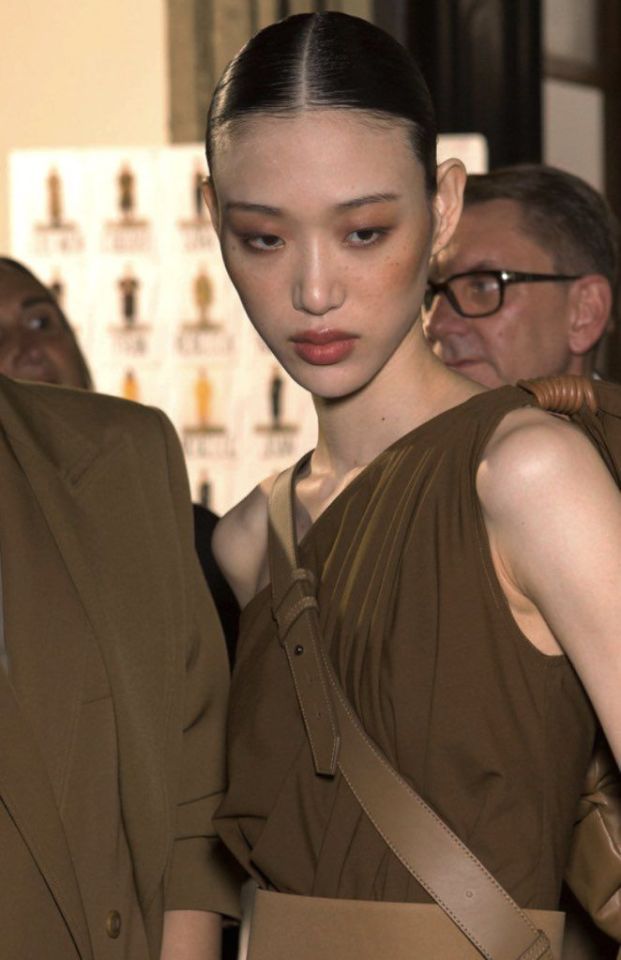
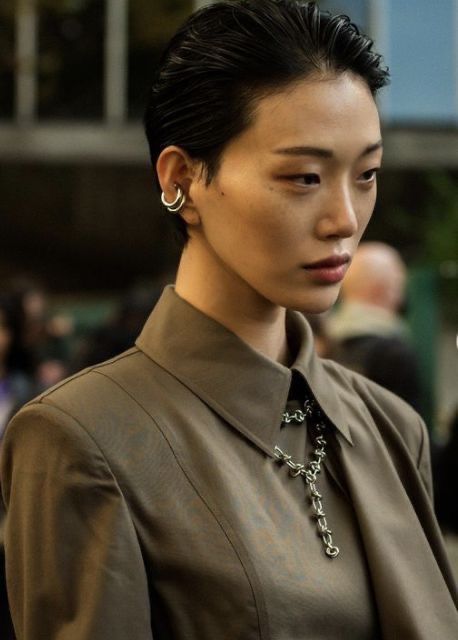
what is a juno persona chart? looking into juno persona chart gives more detailed insight of how the relationship and marriage overall of you and your spouse will be like. it also describes them in a sense as well. The Greek Goddess Juno is described to rule over love and marriage and hence why the asteroid is looked into for that theme.
jupiter represents luck, it expands anything it touches and gives prosperity in that area. in the juno persona chart, jupiter signifies the luck the couple has within the marriage, what possible expansions marriage life of the couple receives and what possibly wisdom the couple takes.

reminder: this is my interpretation from observations and first hand experiences, so don't take this to heart.
**reminder no.2 that this can be used for signs as well, so for example if jupiter is in aries in 6th house, make sure to check out jupiter in 1st house also as it may resonate.

jupiter in 1st house: marriage may be full of quick decisions, not waiting around brings luck to the couple. acting right away is the way to go for this placement. the couple may find luck in cars, perhaps you always have access to transport, have access to cars, may even own lots of cars or some sort of quick transport. marriage may bring growth to developing how to cope with anger or short temper, this placement may bring expansion to have healthy coping mechanisms when it comes to short temper or raising voice. marriage may bless the individual with courage to show the real them for example showing off their real style, personality, likes and interests etc. these individuals may have a very nice and luxurious (a grand) home after marriage, exterior of home may look big and expensive so this may be an indication of having a big house after marriage. jupiter here may brings lots of movement to the individual after marriage, their life may liven up a bit and there may be lots of movement during marriage. life can be full of life, full of passion, desire and motivation so a sense of fulfilment may occur and make the individual feel alive.
spouse may have natal jupiter in aries, 1st house, fire sign or fire house.
jupiter in 2nd house: marriage may bring luck to resources, money, materialistic things and ones value. the couple may receive lots of gifts from other people, not cheap also, this placement just attracts gifts and luxury. also expect people offering you to go out for dinner or lunch after marriage, this brings expansion in areas of socialising and allowing oneself to destress and rewind. marriage can be full of relaxation, after marriage the native can have luck in having s stress free mind or a less one. jupiter here may bring growth to having patience with one another, adapting to foreign environments and finding comfort in anywhere one may go. marriage may bring luck in artistic fields related to the voice, the arts, dancing, cooking, food related and beauty related. this placement may have luck in those themes and may have a business or open up a store related to these themes.
spouse may have natal jupiter in taurus, 2nd house, earth sign or earth house.
jupiter in 3rd house: marriage may bring luck in communication, writing, expression of oneself and getting to the point. this placement bring expansion to speaking so couple much talk things out even if they are the tiniest of little misconceptions they should be sorted out rough communication. i feel like this placement also gives luck in education, so this placement go back to school, college or university after marriage or they decide to study something they have been interested in after marriage. marriage may bring this placement extreme motivation and inspiration from their partner so they may want to complete everything at once as ideas keep coming and coming. this placement may find lessons to do with trust and talking behind each others backs, also learning how to stay within each others energy levels and keeping up with each other ideas and supporting each other in that sense.
spouse may have natal jupiter in gemini, 3rd house, air sign or air house.
jupiter in 4th house: marriage may bring luck in family relations. perhaps getting closer to family through marriage, visiting family more often after marriage, spending more time with the mother especially after marriage. this is also an indication of having luck in having a family of your own, so having kids may bring more luck in that field. having a comfortable home of your own will expand your luck, being comfortable in your own home is very important for example, having every detail of the house according to the way that makes you feel warm and cosy can make a different in your growth as a person. this placement is spiritually gifted with their intuition and learning to believe in themselves. Jupiter here has a lesson to never diss oneself and always believe in your abilities after marriage. through marriage connecting with ones ancestors may bring great fortune also.
spouse may have natal jupiter in cancer, 4th house, water sign or water house.
jupiter in 5th house: the couple may have luck in children. this placement really enhances the amount of children the couple may have, so most likely people with this placement have lots of children. also the couple may find happiness and expansion with children, perhaps it helps with their mental health, their spiritual journey, their mindset and their luck in general. also this placement may find growth in their confidence may grow in confidence and have their own way. also this placement most likely will be quite well known whether its within the community, neighbouring, worldwide etc. This placement finds growth in their ego, so usually after marriage their views of life and their mindset may drrastically change for the better especially after having kids.
spouse may have natal jupiter in leo, 5th house, fire sign or fire house.
jupiter in 6th house: marriage may bring luck to health and fitness. this placement may have fortune in their health for example getting more fitter by going to gym, eating more healthy, changing unhealthy life style, changing up their routine for the better after marriage. the couple may find expansion in the field of taking care of something, perhaps taking care of each other, taking care of pets, taking care of friends, taking care of grand-parents and so forth, however, that will bring luck. jupiter here may bring lessons it terms of criticality, judgement, lack of mentality and perfectionism after marriage. jupiter here brings luck in routine, their day-to-day life may be lucky for example someone with this placement may just get opportunities when going to the store or finding a valuable item while walking a dog and so forth.
spouse may have natal jupiter in virgo, 6th house, earth sign or earth house.
jupiter in 7th house: marriage may be favourable in having good relations to each others grandparents. this placement may experience lots of luck in law situations such as legal matters related to the government and documents. the couple may never be involved in problems related to the law or always have luck in that field. marriage may bring luck to connections and relations in general, you may have more ease connecting with other people, you may get on with people more easily. this may work to this placements favour as it can expand the amount of opportunities one can receive, getting more compliments, being liked by people you thought disliked you and so forth.
spouse may have natal jupiter in libra, 7th house, air sign or air house.
jupiter in 8th house: couple may have luck in keeping secrets, what i mean by that is they keep things private very well so that comes to an advantage to them because it shocks the people around them and question things like 'since when??' or 'whatt?' that sort of vibe. this placement keeps people wondering, guessing and interested in your marriage and this placement never gives them the satisfaction. this protects the couples privacy and protects their energy also. this protects the couple from negative energy which protects their luck. this is a very powerful placement to have since this expands the spiritual bond between he couple also. strategizing goals and researching and just planning in general may bring luck to this placement for example, planning outings, shopping, researching contracts and the background of the contract before signing, researching what holiday you'll be travelling to and so forth.
spouse may have natal jupiter in scorpio, 8th house, water sign or water house.
jupiter in 9th house: this placement brings luck to those who travel abroad, living outside of the environment that they grew up in will bring growth and extreme luck. another thing is that the couple may find luck in being enthusiastic and charismatic, also making jokes and taking things with a grain of salt, not over exaggerating stuff will be favourable for this placement. also marriage may be full of discovery, always learning, always exploring. being in a good relationship with parent-in-law brings luck to the marriage so being in good terms with spouses parents may be very favourable for this placement and may bring lots of opportunities related to travel, fulfilment, study and spiritual growth. another thing with this placement is that jupiter being in its home house, this is very expanding and broadening in terms of their conscious mind, jupiter can guide the couple in marriage and incline their mental and astral growth. basically, marriage is spiritually guided by the higher energies, marriage was meant to happen in order for this placement to achieve and complete their mission of this physical realm.
spouse may have natal jupiter in sagittarius, 9th house, fire sign or fire house.
jupiter in 10th house: marriage may bring luck in image of this placement. the couple may find luck in their career, may get promotions, upgrades, bonuses, movement to higher position etc etc. jupiter here gives luck in other peoples view about you, the vast majority of people may have a different perception of you in a good way after marriage. also marriage may bring reputation to your image that expands your opportunities and respect from other people. also people may find you more serious after marriage. an honourable thing to keep in mind with this placement is that over a certain period of time, jupiter brings severe luck through hard work and determination for this placement during marriage, marriage may strengthen and jupiter offers its full expansion later in life in this marriage. this is also an indication of a very long lasting marriage, even a marriage that last until old age.
spouse may have natal jupiter in capricorn, 10th house, earth sign or earth house.
jupiter in 11th house: marriage may find luck in social gatherings, groups and outings. couple may face extreme luck on social media and technology, for example may have a successful social media platform or have extreme luck with technology, long-lasting, fast running and so forth. marriage may expand social groups also, this placement may find more accepting and understanding friends after marriage especially. may also find their true friend group after marriage. this placement may also experience growth in expressing themselves the way its most authentically true to themselves and being comfortable about it after marriage. this is also a placement that brings unplanned events and turns it into the most luckiest thing ever, this placement may find the most luck through spontaneous events, events that happen through spite for example getting calls from an old friend to go to a café the next day, that day turns out to be one of the best, or another example may be getting invited to an important event having only a short period of time of notice, when arriving at event you see people that are well known and receiving offers from them and so on.
spouse may have natal jupiter in aquarius, 11th house, air sign or air house.
jupiter in 12th house: this placement may have luck in spirituality, the couple may be spiritually guided by the universe and have luck overseas. for example when travelling pay just have the best luck ever and may feel complete when travelling long distances in general. this placement often brings luck when it comes to sleeping, for example you may be guided when in bed with your partner if that makes ant sense, like you may feel better you may sleep better and you may even dream better. marriage may bring luck in artistic areas of life for example having luck in being an artist, singer, model, teacher, poet, also tarot reader. this placement may get oversea recognition in these artistic areas. marriage may expand the mind to prioritise mindfulness in order to not fall into dangerous addiction tendencies so it is very important to find peace and a healthy coping mechanism through spirituality.
spouse may have natal jupiter in pisces, in 12th house, water sign or water house.


thanks so much for reading, have a nice day ahead!🌛⭐🌼
#juno#juno persona chart#asteroid#juno astrology#astro#astrology#asteroid astrology#astro notes#astro observations#astro placements#astrology community#astrology observations#kpop astrology#celebrity astrology#astro community#zodiac signs#astrology signs#future#future spouse#marriage
2K notes
·
View notes
Text
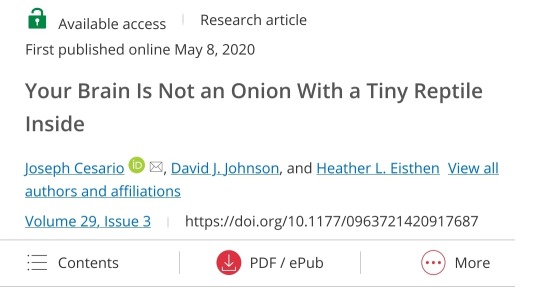
A widespread misconception in much of psychology is that (a) as vertebrate animals evolved, “newer” brain structures were added over existing “older” brain structures, and (b) these newer, more complex structures endowed animals with newer and more complex psychological functions, behavioral flexibility, and language. This belief, although widely shared in introductory psychology textbooks, has long been discredited among neurobiologists and stands in contrast to the clear and unanimous agreement on these issues among those studying nervous-system evolution. We bring psychologists up to date on this issue by describing the more accurate model of neural evolution, and we provide examples of how this inaccurate view may have impeded progress in psychology. We urge psychologists to abandon this mistaken view of human brains.
3K notes
·
View notes